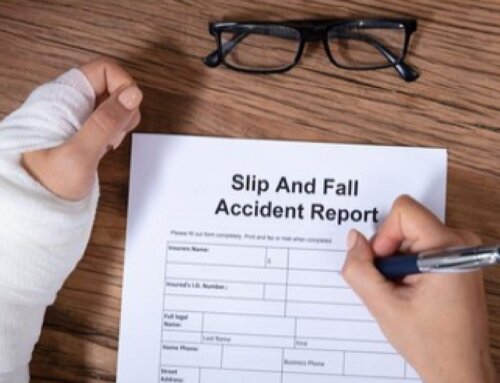We all expect to go about our day-to-day business safely – and rightly so. Unfortunately, though, accidents can happen anywhere – at work, when we’re doing the weekly shop, on the school run, in the gym – the list is endless.
If we’ve been involved in an accident which wasn’t our fault and suffered harm, it’s only right that those responsible are held to account. We deserve to be compensated for our physical and psychological injuries and any financial loss incurred as a result of the accident. That’s where personal injury law comes in. It exists to put right a wrong that has been suffered.
So, if those responsible for your accident owed you a duty of care, and if the various other legal requirements are met, you can – and should – consider claiming compensation for personal injury.
We’re often told that people are hesitant to bring a personal injury claim because they are unsure of their rights. So, we’ve pulled together this straightforward overview to help you know your rights with a personal injury claim.
What types of accidents can you claim for?
You can make a personal injury claim following a wide range of accidents, including –
Road Traffic Accidents

Accidents at Work
Headline figures published by the Health and Safety Executive show that in 2021/2022, 1.8 million people were suffering from a work-related illness, 565,000 sustained a work-related injury, and 123 workers were killed in accidents at work. Common workplace accidents include slips, trips and falls, cuts and lacerations and being hit by falling objects. A claim for an accident at work is usually brought against your employer, who will have insurance in place to deal with it.
Accidents in public places
The law states that accidents in public places can happen on a highway or any other place to which the public has access, whether through payment or not. The types of accidents which can occur in public places are wide and varied. You might trip over a pothole in the pavement, be hit by a falling shop sign or suffer an injury when using faulty sports equipment at your local leisure centre, to name but a few.
These are just some examples of accidents that can give rise to a personal injury claim. For a complete list, click here.
What types of injury can I claim for?
Since any part of your body can be injured in an accident, the types of physical injury you can claim for are vast. They include head or brain injuries, spinal injuries, burns, scars and lacerations, and eye damage.
In addition to physical injuries, you can also claim for any psychological damage you have sustained. Accidents can lead to long-term psychological problems, ranging from mild anxiety to severe post-traumatic stress and depression, which can have a devastating effect on your day-to-day life.
Someone involved in a car accident may develop a crippling fear of the road, for example, or you may find yourself reliving your accident or an event you witnessed over and over again, putting a strain on relationships and making it difficult to do your job.
For a full list of the types of injuries we regularly help clients get compensation for, click here.
What legal requirements apply to personal injury claims?

The other party owed you a duty of care. This legal duty requires an individual to act in a way that ensures the safety of others. It applies to many situations –drivers, for example, have a duty to drive with reasonable care and skill, and employers are under a duty to protect their employees’ health and welfare in the workplace.
The other party breached their duty of care. A failure to live up to the expected standard of care will constitute a breach. Examples of breaches include driving carelessly or failing to ensure a workplace is safe from hazards.
Causation. You must be able to show that the breach caused the accident. Whilst this may sound straightforward (and often is), it can be tricky in some cases. In a clinical negligence claim relating to a delay in treatment by a medical professional, for example, if the outcome may have been the same even with timely medical care, proving that the breach caused the outcome might prove problematic and require considerable medical evidence.
Damage. It goes without saying that you can only bring a personal injury claim if you have suffered an injury, be it physical, psychological or both.
Time limits. In general, you have three years from the date you become aware of your injury to make a personal injury claim. The time limit is strict, and different time limits may apply in some situations. You should therefore seek legal advice as soon as possible to protect your position and avoid jeopardising your claim.
What is my claim worth?
It’s only natural to want to know how much personal injury compensation you can expect. We know this isn’t about collecting in some ‘windfall’. It’s about wanting to know that you will be adequately compensated for the pain you’ve suffered due to someone else’s negligence and getting peace of mind that any financial losses will be made good.
The reality is, though, that until the evidence has been collected and reviewed, it’s impossible to assess the likely level of compensation. Two people with identical injuries may be affected in entirely different ways, and the financial impact of the injuries may vary significantly.
So, whilst we can explain the types of compensation you can expect, the exact sums can’t be calculated until we have had a chance to consider your case fully.
Your claim will include ‘general’ damages for loss and suffering and ‘special’ damages for financial loss (including loss of earnings and medical expenses).
Whilst there are guidelines setting out the level of general damages considered suitable for different injuries, these are only a guide; a Judge will assess the appropriate compensation level based on your circumstances and the nature of your accident and injuries.
You can, however, get a feel for the range of compensation a Judge might consider appropriate with our free personal injury calculator.
It’s important to point out that most personal injury claims won’t end up in a court hearing. The majority settle before you get to court by negotiation between legal advisors of the parties involved.
If you want to discuss the possibility of making a personal injury claim, call us at Mooneerams, at any time, on 029 2048 3615. A friendly and knowledgeable member of our specialist personal injury team will be on hand to listen to what you say and then provide you with their advice. If we think you could claim with reasonable prospects of success, we’d be delighted to take on your claim. (We handle most personal injury claims on a No Win No Fee basis).









